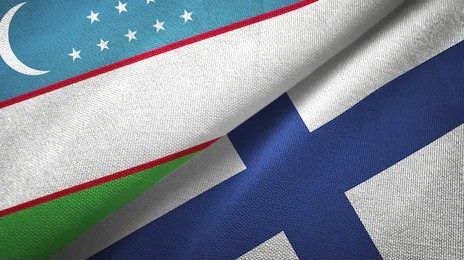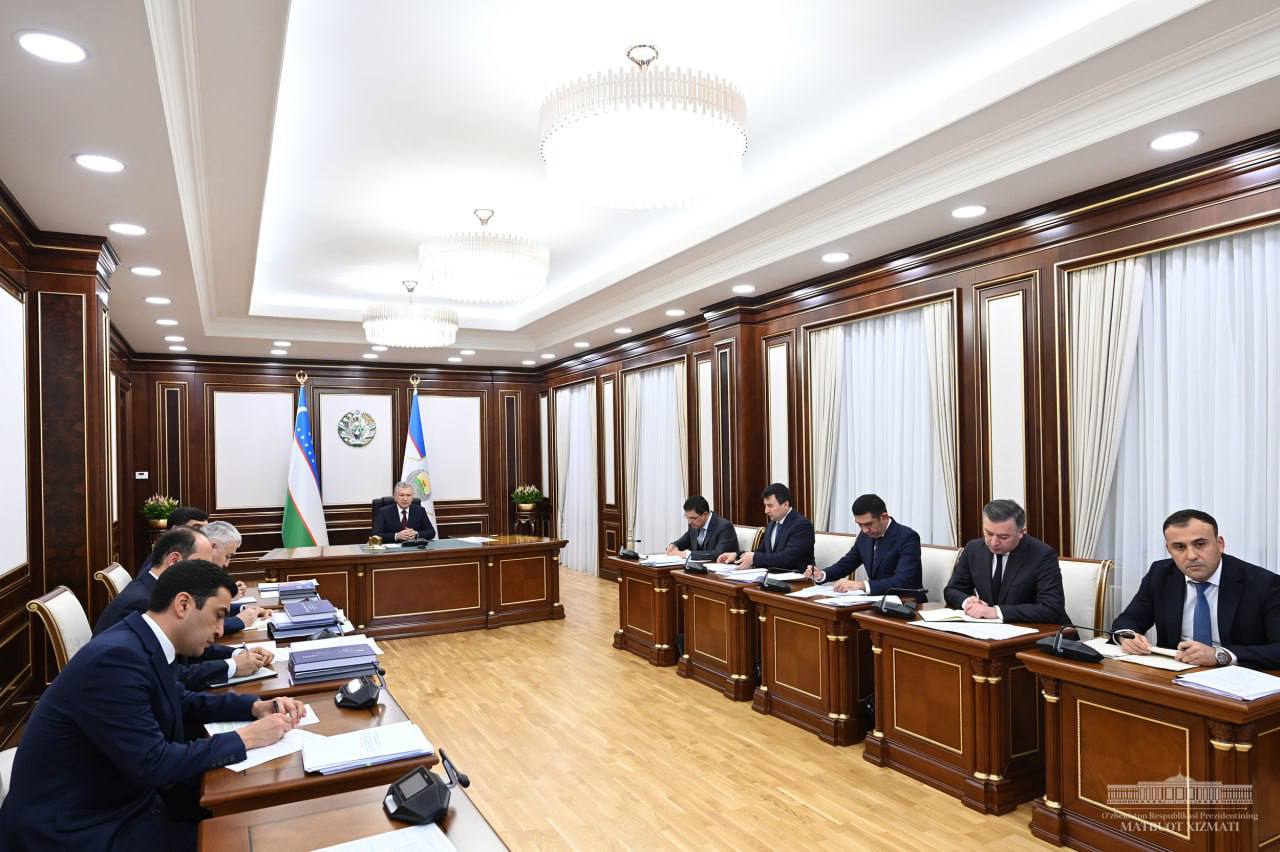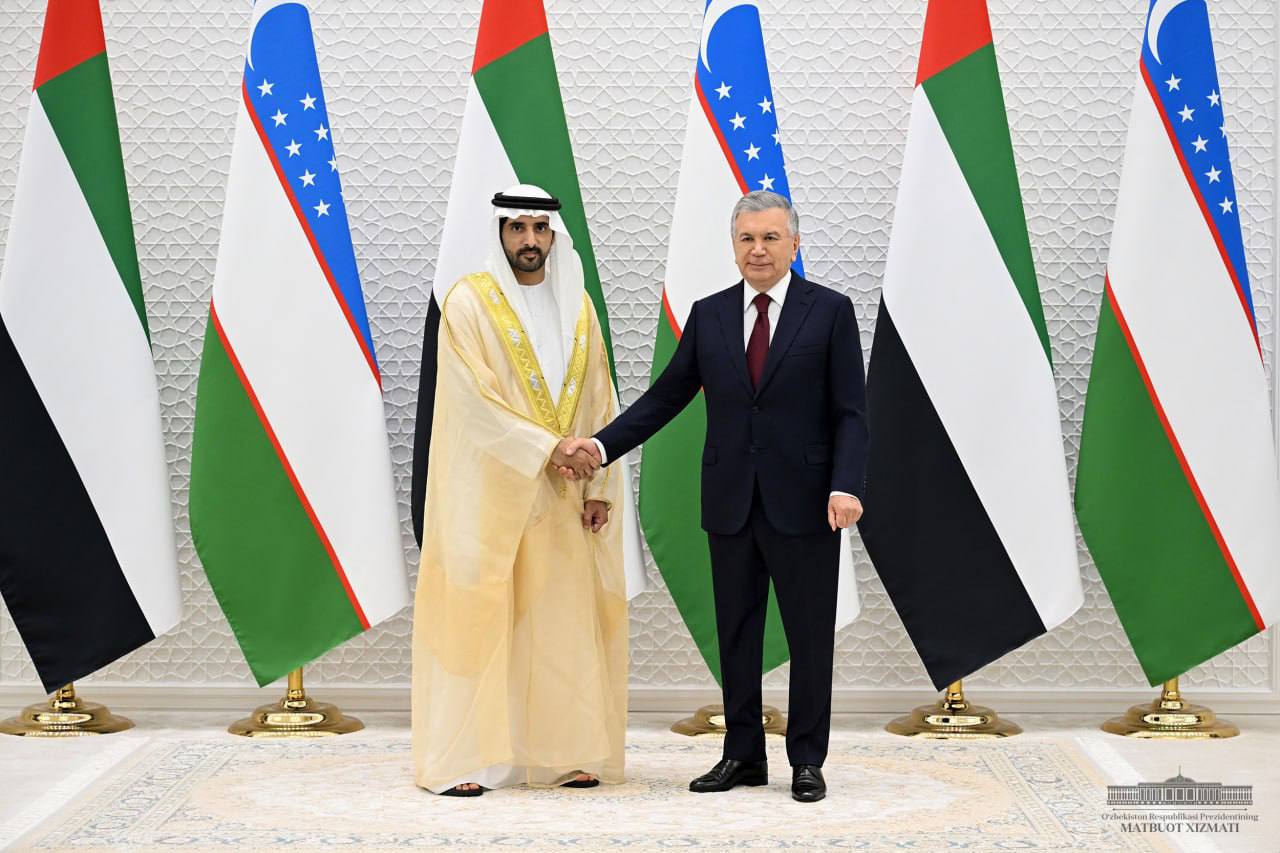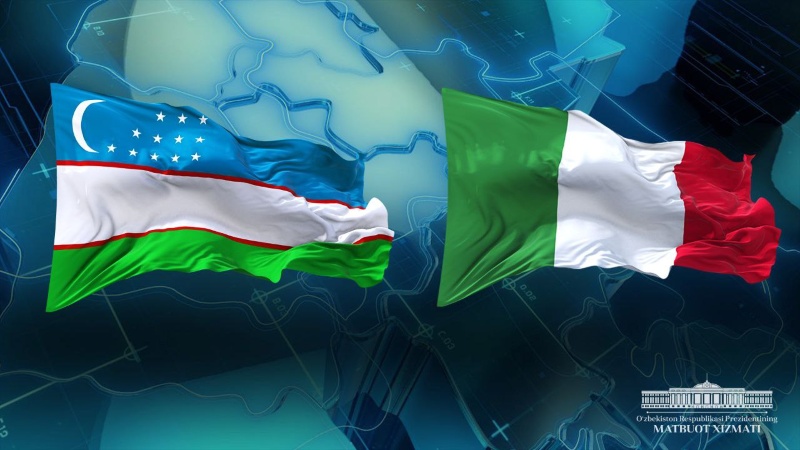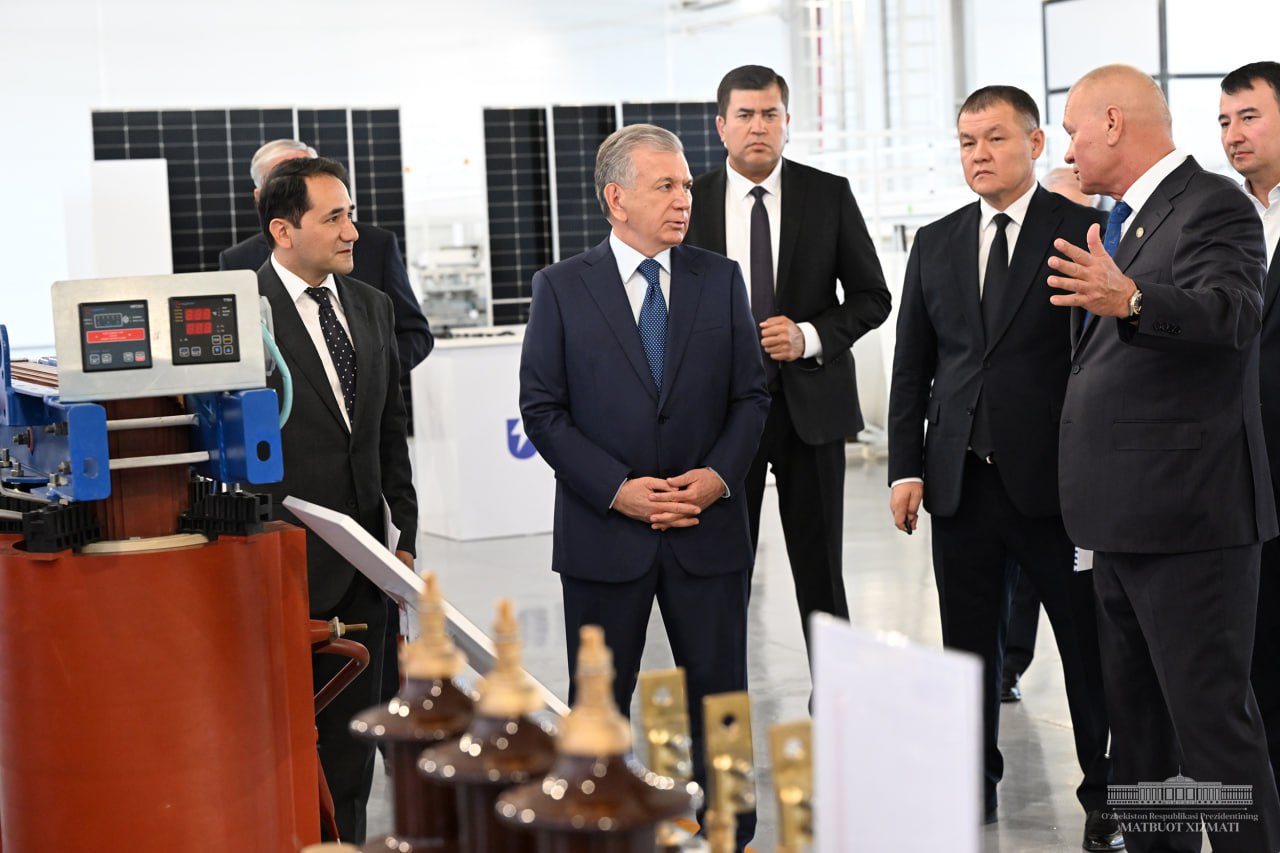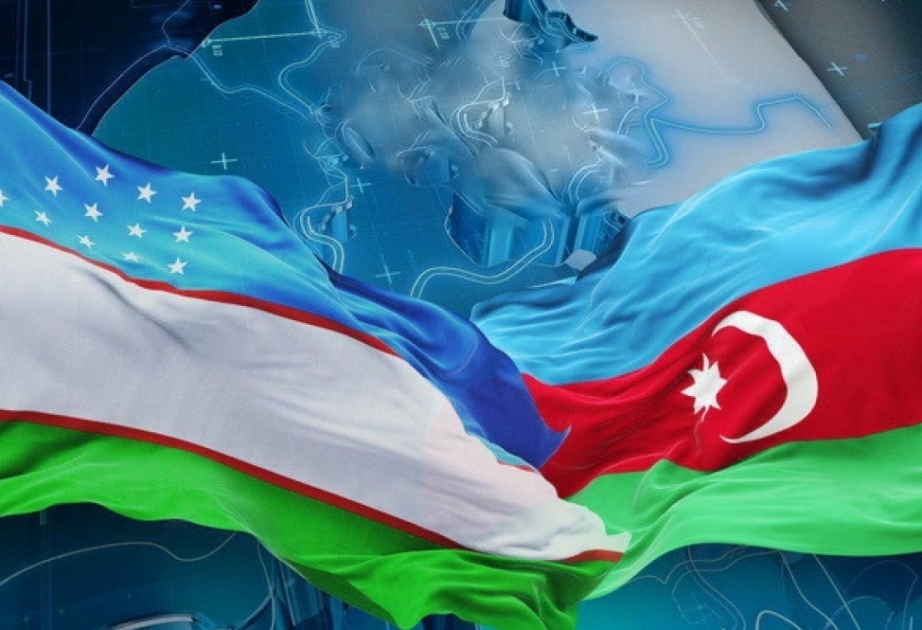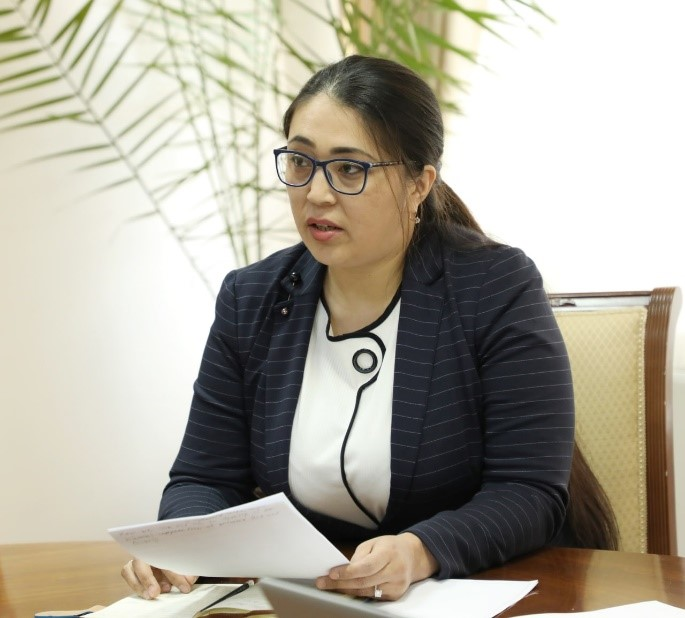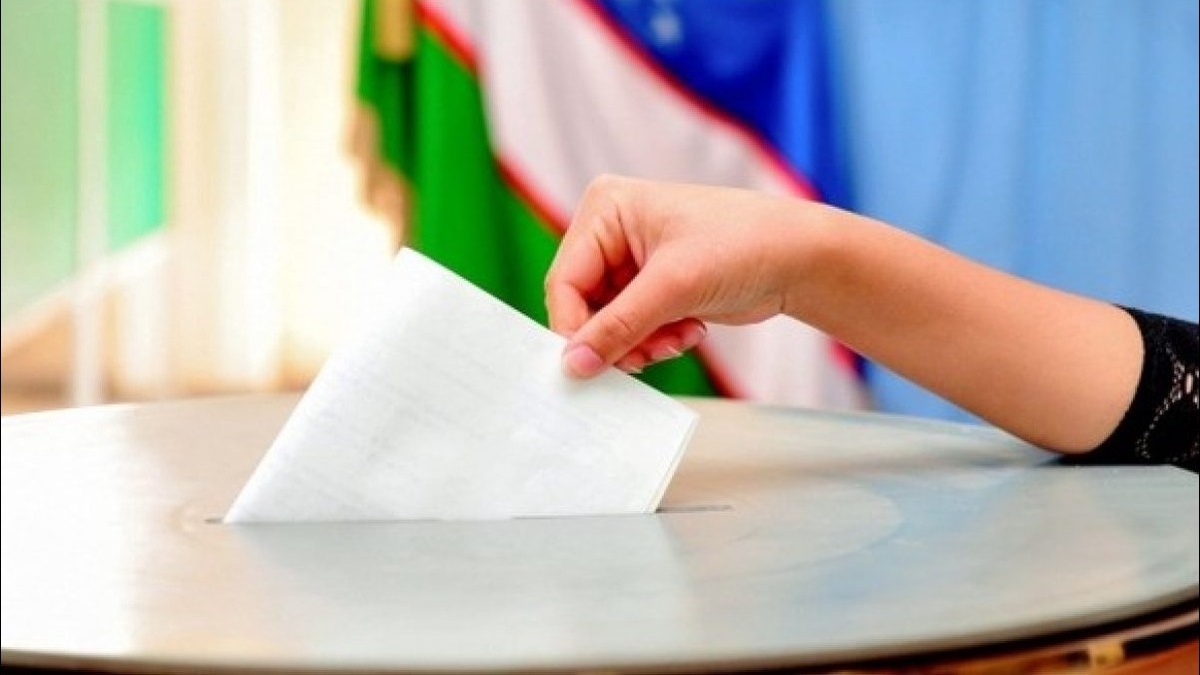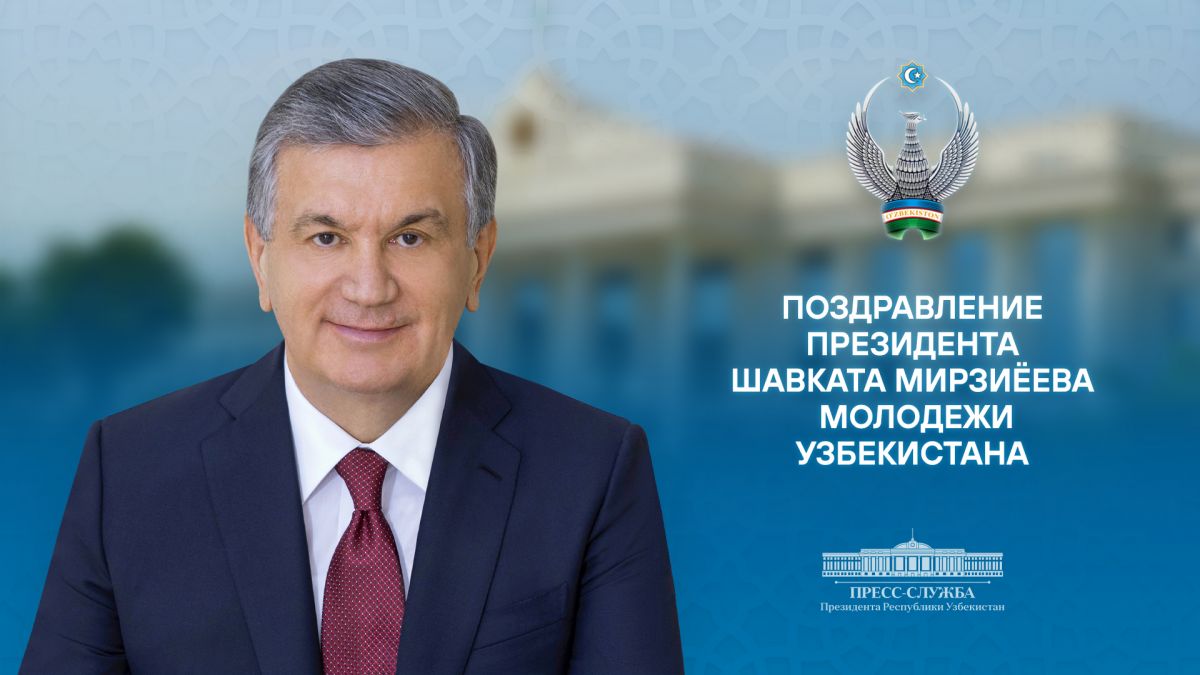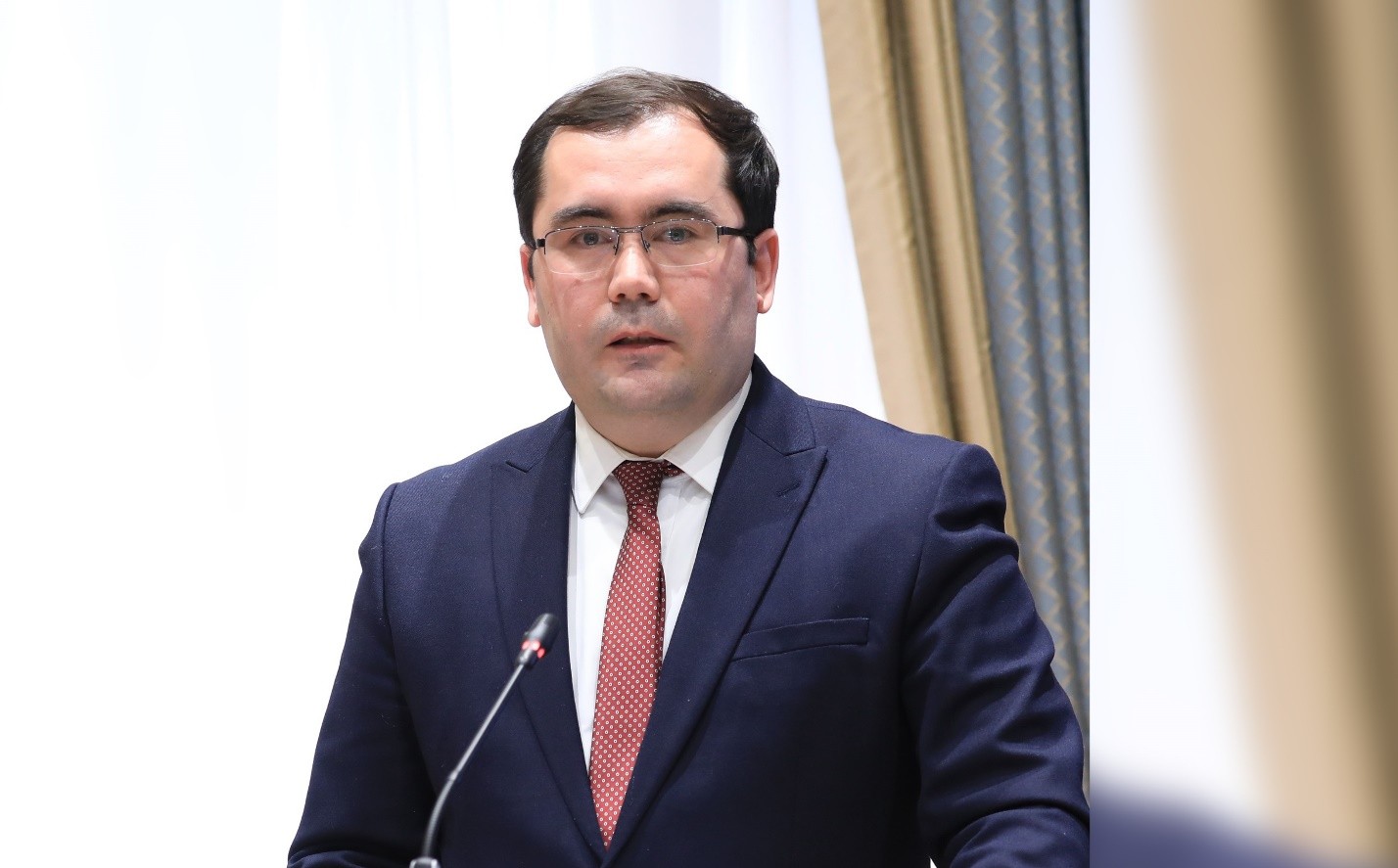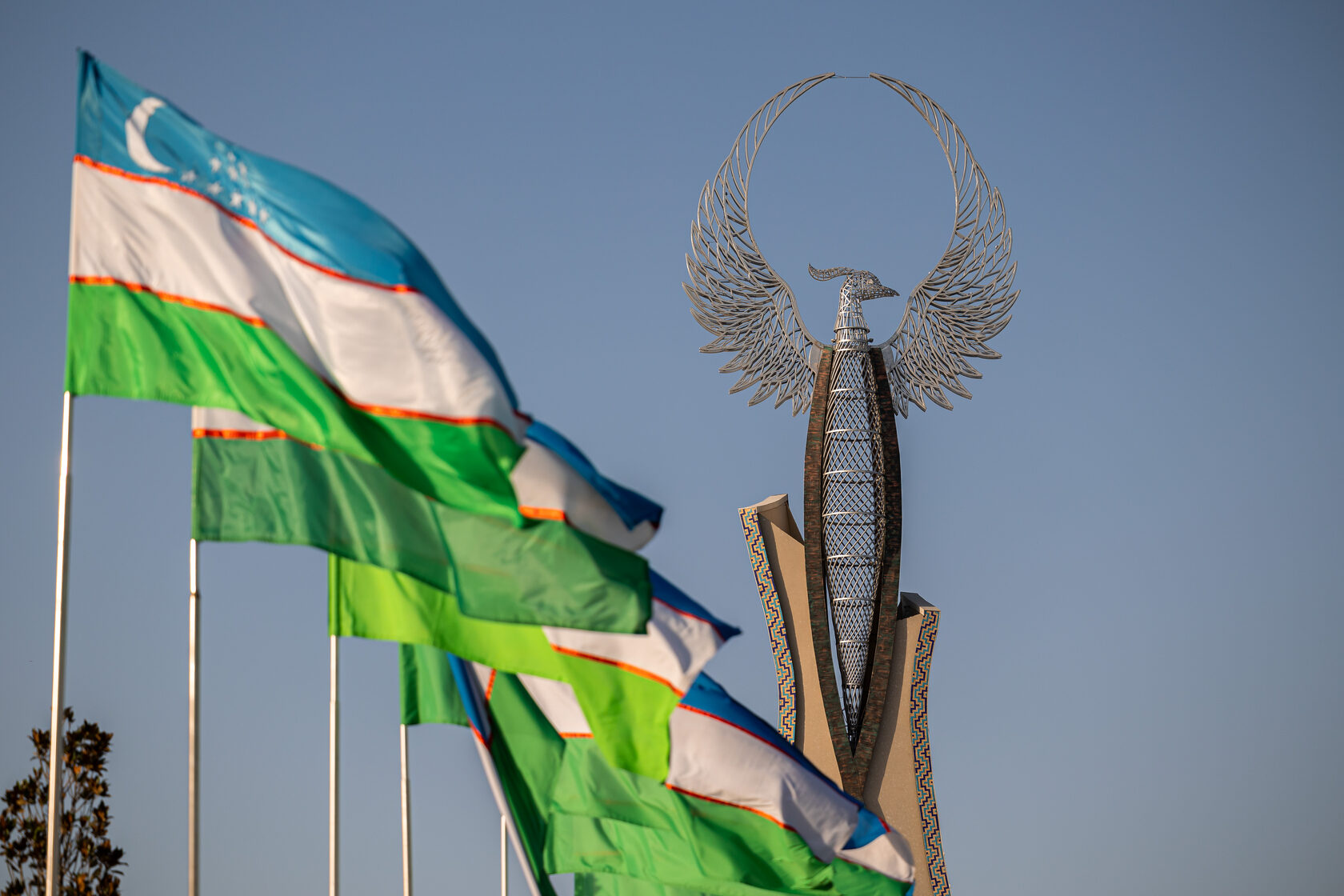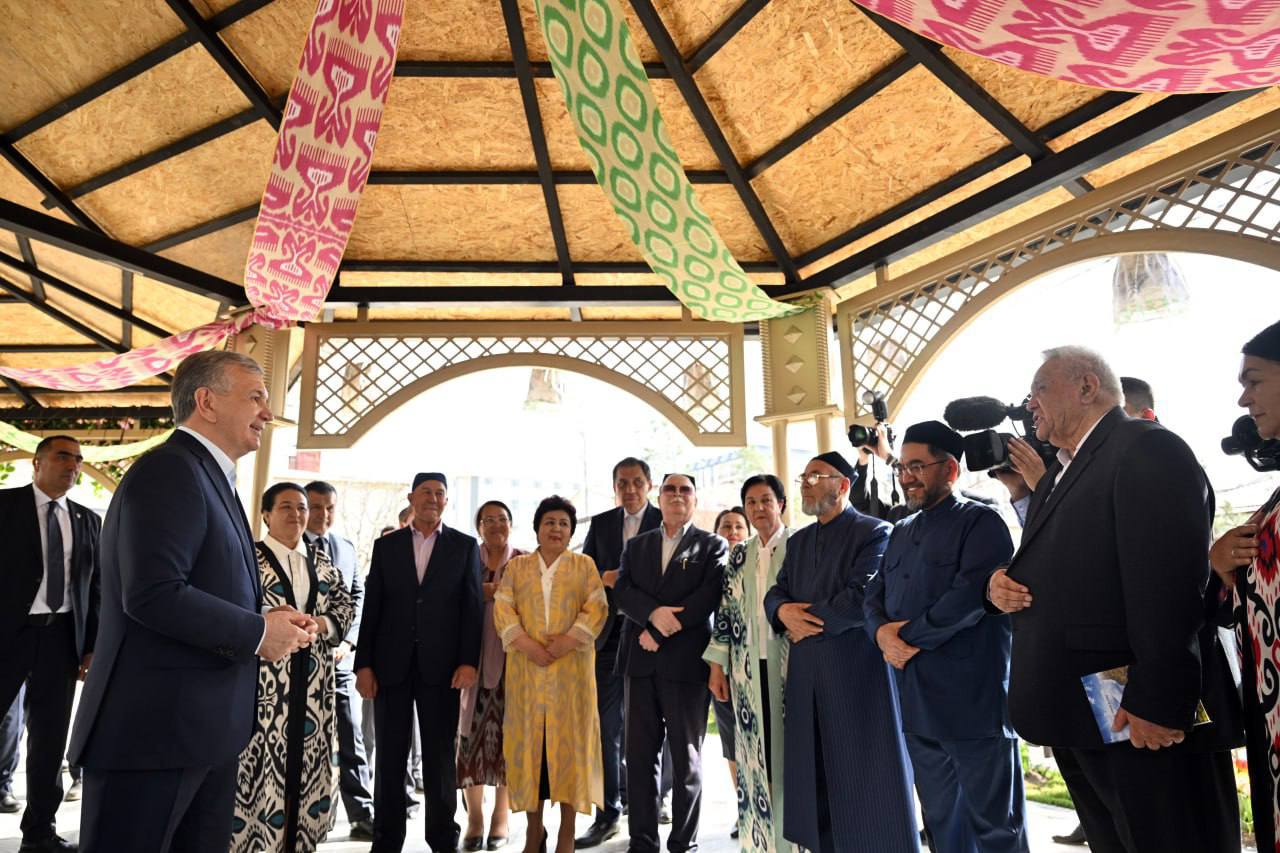Phone
Consular Issues
Phone
Uzbekistan news
We recommend
Uzbekistan and Finland: Digital Groundwater Modeling as a Contribution to Climate Resilience in Central Asia
📅 06.11.2025
Amid growing water scarcity and climate instability in Central Asia, Uzbekistan and Finland are implementing a unique form of scientific cooperation that combines digital innovation with sustainable water resource management.
In 2021, the Ministry of Mining Industry and Geology of the Republic of Uzbekistan and the Geological Survey of Finland (GTK) signed a Memorandum of Understanding aimed at the rational development of natural resources through advanced technologies. Today, this project stands as an example of scientific diplomacy that unites European expertise with Uzbekistan’s potential.
From Paper Maps to Digital Models.
For many years, hydrogeological maps of Uzbekistan existed only in paper form. Within the framework of the joint project, they were digitized using the ArcGIS platform, creating a unified national groundwater database. This digital transformation enables specialists to monitor aquifer conditions, analyze water balances, and forecast the impacts of climate change.
Finnish experts conducted a series of training programs for Uzbek specialists, introducing modern methods of digital mapping and data processing. This strengthened the professional capacity of the sector and laid the foundation for scientifically grounded and transparent water resource management.
Scientific Practice: Experimental Site in Akhangaran.
An experimental site was established in the Akhangaran district of the Tashkent region, where joint research teams conducted geophysical studies and developed digital models of groundwater flow. The obtained data help predict groundwater levels, plan water supply systems, and identify areas vulnerable to drought.
The use of the MODFLOW software package made it possible to create models that provide scientifically based solutions for water resource allocation — particularly important for regions with limited water reserves.
European Partnership for Climate Resilience.
Cooperation with Finland is part of a broader European agenda aimed at supporting climate adaptation and sustainable development in Central Asia. By combining European technologies with Uzbekistan’s scientific resources, the project demonstrates how international partnerships can strengthen ecological security and water stability.
The results of the joint work were published in the journal Water (Scopus) under the title “Assessing Climate Change Impacts on Groundwater Recharge and Storage Using MODFLOW in the Akhangaran River Alluvial Aquifer, Eastern Uzbekistan.”
Furthermore, new areas of cooperation have opened — with the University of Padua (Italy) in geological risk monitoring, and with the Belarusian Scientific and Production Center for Geology in groundwater observation.
Looking Ahead.
The joint project between Uzbekistan and Finland is more than a transfer of technology — it represents a step toward creating a new culture of rational water use and responsible climate action. The establishment of a national digital hydrogeological database will become a key element in the country’s environmentally sustainable development.
As Europe and Central Asia continue to strengthen cooperation in water, energy, and climate, the Uzbek-Finnish project serves as a model of how scientific initiatives can deliver tangible environmental and social benefits.
Investments’ implementation, poverty and unemployment reduction set as priority tasks in Bukhara
📅 02.12.2024
On November 29, President Shavkat Mirziyoyev convened a meeting dedicated to identifying additional opportunities, increasing investments and jobs in Bukhara region.
Previously, the economy of this region was mainly linked to agriculture. However, over the past seven years, the region has attracted more than $4 billion investments, enabling development of such industries as energy, electrical engineering, chemicals, pharmaceuticals, textiles and leather. In the past period of the current year, 1.5 million foreign tourists visited Bukhara.
The visit of the Head of State to the region on May 31-June 1 gave a new impetus to its development. All the tasks outlined during the visit will be fully accomplished by the end of the year.
At the same time, it is important to ensure further growth of economic indicators in 2025, increase employment and well-being of the population. To this end, the working group studied additional opportunities of the region and factors hindering entrepreneurship development.
The critical meeting emphasized that the region's economic performance does not correspond to its potential. Work on investment absorption, poverty and unemployment reduction was recognized as unsatisfactory.
In this regard, the hokims, their deputies and sector heads will be put on emergency duty for a period of six months. The entire focus will be on improving these three areas. Special attention will be paid to implementing 70 driver projects based on the experience of Saikhunobad, Uychi, Zarbdar and Gijduvan. They will provide income to 150 thousand people and lift 40 thousand people out of poverty.
As it was mentioned, each district of the region can be specialized for a certain industry. For example, Peshku and Shafirkan - for production of construction materials and textiles, Kagan city, Alat and Jondor districts - for food industry, Gijduvan and Romitan - for chemical industry. This will make it possible to implement projects of entrepreneurs worth $150 million, create 411 small enterprises and provide 12 thousand jobs.
Four textile factories are planned to be built in Vabkent, Karakul, Jondor and Alat at a total cost of $320 million. This will double the volume of finished knitwear and textile products and create 5,000 jobs.
Next year, the number of foreign tourists is expected to reach 2.2 million and tourism exports are expected to reach $600 million. This will be supported by opening 69 new hotels and 2 thousand handicraft stores.
It is planned to develop additional 20 thousand hectares of land, which will allow to grow additional 100 thousand tons of agricultural products and provide employment for 2 thousand people. Trees and food crops will be planted on vacant homestead land, along canals and field edges.
Another opportunity is pastures. In Bukhara region their area exceeds 2 million hectares. As part of the decisions made at a recent meeting on horticultural development, it is planned to grow pistachios on unused pastures.
Hokim of Bukhara region presented plans to utilize these opportunities. In general, next year 106 projects will be implemented, 105 thousand permanent jobs will be created, exports will be increased by $350 million due to foreign investments worth $2 billion.
The Head of State pointed out the insufficiency of these plans and instructed to intensify efforts and improve results. He tasked to revise the proposals again and draft a relevant resolution.
President of Uzbekistan considers promising areas and projects of cooperation with UAE
📅 30.09.2024
Issues of further development of multifaceted partnership, promotion of economic and investment cooperation projects, establishment of practical interaction in the defense sector were discussed at the meeting between President of the Republic of Uzbekistan Shavkat Mirziyoyev and a delegation from the United Arab Emirates headed by Deputy Prime Minister, Minister of Defense, Crown Prince of the Emirate of Dubai Sheikh Hamdan bin Muhammad Al Maktoum.
The Emirati delegation included the Ministers of Government Affairs Muhammad bin Abdullah Al Gergawi, Energy and Infrastructure Suhail bin Muhammad Al Mazroui, Economy Abdullah bin Tuq Al Marri, and Minister of State for Artificial Intelligence and Digital Economy Omar bin Sultan Al Olama.
At the beginning of the conversation, Sheikh Hamdan Al Maktoum expressed his sincere gratitude to our Head of State for the warm welcome and conveyed warm greetings from UAE President Sheikh Mohammad Al Nahyan and Prime Minister of the UAE, Emir of Dubai Sheikh Mohammad Al Maktoum.
During the meeting, special attention was paid to the issues of forming a new long-term agenda of mutually beneficial cooperation in such key areas as investment, innovative development, green energy, infrastructure, education, healthcare, ecology, digital transformation, tourism and others.
The sides highly appreciated the fruitful results of the joint forum on unlocking the potential of mutually beneficial cooperation, bilateral intergovernmental and interdepartmental talks held this morning.
An agreement was reached to adopt a road map for the development of full-scale cooperation in strategic sectors.
It should be noted that the UAE is one of Uzbekistan's key partners in the Asian region.
The latest high-level contacts took place within the framework of the Global Climate Summit in Dubai last December.
The trade turnover in 2023 grew by 21 percent and amounted to 626 million dollars. More than 320 enterprises with the participation of Emirati capital operate in our country. The portfolio of ongoing and prospective investment projects amounts to about 20 billion dollars.
On May 28-29, the Prime Minister of Italy will pay an official visit to Uzbekistan
📅 27.05.2025
The President familiarized himself with the new project of the joint venture
📅 19.08.2024
Президент Шавкат Мирзиёев начал свою поездку в Республику Каракалпакстан с ознакомления с промышленным потенциалом региона.
Совместное предприятие “Nukus Eleсtroapparat” было введено в строй в 2017 году, оно производит силовое оборудование для электросетей. В июне текущего года здесь был запущен проект по изготовлению солнечных панелей стоимостью более 10 миллионов долларов. Оборудование было доставлено и установлено из Республики Корея. Производственный процесс полностью автоматизирован. Годовая мощность проекта составляет 273 тысячи единиц.
Это будет способствовать дальнейшему внедрению альтернативной энергетики в нашей стране. На сегодняшний день в различных сооружениях и домах установлены солнечные панели общей мощностью 600 мегаватт. Этот процесс продолжается.
Наряду с локализацией востребованной на внутреннем рынке продукции совместное предприятие получило возможность экспортировать продукцию на 4 миллиона долларов. Обеспечено работой 70 человек.
Глава нашего государства ознакомился с технологическим процессом, побеседовал с работниками. Ответственным лицам даны указания по увеличению количества таких предприятий и производству ими продукции с высоким спросом на рынке.
Здесь же была представлена продукция, производимая предприятиями отрасли.
На самом заводе установлены солнечные панели мощностью 125 киловатт. Полученная электроэнергия используется для внутренних нужд, а излишки реализуются в региональную электросеть.
За последние годы в нашей стране за счет инвестиций в размере 2 миллиардов долларов введены в эксплуатацию 10 солнечных и ветряных станций общей мощностью 2,6 гигаватта. Также ведется работа по 32 "зеленым" проектам мощностью 18,6 гигаватта общей стоимостью 19 миллиардов долларов. В целом к 2030 году намечено довести долю возобновляемых источников энергии в энергетическом балансе до 40 процентов.
Uzbekistan – OTS: Cooperation on the Path of Sustainable Development and Progress
📅 08.10.2025
President of Uzbekistan Shavkat Mirziyoyev arrived in the Azerbaijani city of Gabala to participate in the summit of the Organization of Turkic States (OTS).
Due to its geographical position, historical ties, and natural resources, the Organization of Turkic States is becoming an increasingly significant platform for cooperation at this new stage of development. At the same time, OTS serves as a cultural bridge, fostering closer ties between the peoples of its member countries.
The Organization is based on the principles of equality and mutual interest, non-interference in internal affairs, and respect for the sovereignty of states - principles widely recognized by the international community.
The OTS comprises five member states: Azerbaijan, Kazakhstan, Kyrgyzstan, Turkiye, and Uzbekistan. Hungary, Turkmenistan, and the Economic Cooperation Organization hold observer status.
The current name of the Organization was introduced on November 12, 2021, at the initiative of the President of Uzbekistan. Previously, it was known as the Cooperation Council of Turkic Speaking States.
The primary goal of the OTS is to strengthen trust and multifaceted ties among the brotherly nations, to promote cooperation in trade, economy, energy, transport, tourism, cultural and humanitarian spheres, and to coordinate efforts to ensure peace and security in the region.
The conceptual foundation for achieving these objectives is the “Turkic Vision – 2040” program, adopted following the Eighth Summit of Heads of State held in Istanbul in November 2021.
For Uzbekistan, which joined the Organization in 2019, participation has become an important step not only in strengthening economic and political ties but also in preserving and developing the shared cultural identity of the Turkic world.
Uzbekistan chaired the OTS in 2022–2023, beginning with the Samarkand Summit in November 2022 under the motto “A New Era of Turkic Civilization: Towards Common Development and Prosperity”.
During its chairmanship, more than 100 events were held, and new platforms for practical cooperation were created. Uzbekistan pursued an open, inclusive, and diverse model of interaction, embracing various regions and civilizations.
The adoption of the “OTS Strategy for 2022–2026” at the Samarkand Summit became a major milestone. This document marked the first roadmap for the implementation of the “Turkic Vision – 2040” concept.
President Shavkat Mirziyoyev has actively participated in OTS summits since Uzbekistan joined the Organization. In particular, he took part in the meetings of the Council of Heads of State on November 6, 2024, in Bishkek and May 21, 2025, in Budapest.
These meetings focused on the current state and future prospects of multilateral cooperation, as well as key issues of practical partnership.
In his address at the informal summit in Budapest, the President emphasized the complexity of today’s geopolitical and geo-economic situation, the intensification of regional conflicts, and the impact of climate change.
He stressed the importance of resolving international issues based on international law and the UN Charter, and the need for common positions and coordinated approaches among member states.
Speaking about the development of practical cooperation within the OTS, the President noted the enormous untapped potential and put forward several new initiatives.
Particular importance is attached to Uzbekistan’s proposal to sign a Treaty on Strategic Partnership, Eternal Friendship, and Brotherhood among the Turkic States, which would represent a significant step toward deeper unity and the creation of a long-term legal foundation for multilateral cooperation.
“Last year, we proposed developing a treaty on strategic partnership, eternal friendship, and brotherhood among the Turkic states. Today, the significance of this document is growing. Undoubtedly, it will promote further unity among our peoples and solidify the long-term legal framework for multilateral cooperation. I propose signing this document at the summit in Baku”, - the President stated.
Since 2019, President Shavkat Mirziyoyev has put forward 98 practical initiatives at OTS summits aimed at advancing multilateral cooperation. More than 70 have already been implemented, and about 30 are in the process of realization.
For Uzbekistan, the main priority within the OTS is the economy. The country is currently focused on boosting exports, attracting investment, creating jobs, addressing unemployment, and reducing poverty. All these goals are closely tied to global economic integration, where the OTS format can support further coordination and development of production chains.
The total area of the OTS member states is approximately 4.2 million square kilometers, with a combined population of over 170 million - representing vast opportunities and a substantial market.
Under existing agreements, the OTS is viewed as an effective mechanism for regional cooperation with great integrative potential. Trade and economic indicators between member states are growing every year.
Today, OTS countries collectively rank third - after China and Russia - among Uzbekistan’s external trade partners. In 2024, mutual trade volume reached nearly $10 billion, accounting for about 15% of the country's total foreign trade.
Trade relations with Kazakhstan - Uzbekistan’s largest trade partner within the OTS - and Turkiye - the second largest - are showing particularly strong growth. By the end of 2024, trade turnover with Kazakhstan reached $4.28 billion, and with Turkiye, $2.9 billion.
Trade with Azerbaijan also continues to show positive dynamics. Notably, mutual trade volumes with OTS partners are setting new records each year.
Uzbekistan’s key exports to OTS markets include textiles, electrical products, automobiles, fruits and vegetables, and non-ferrous metals. Imports from OTS countries consist of rolled metal, aluminum, mechanical tools, construction materials, petroleum products, and a significant portion of grain and other food items.
To maintain and accelerate this positive trend, it is crucial to implement President Shavkat Mirziyoyev’s initiatives, including the creation of the “TURK-TRADE” online platform to facilitate and speed up trade operations, and the adoption of a Program of Practical Measures to Expand Trade aimed at increasing mutual trade volumes.
Industrial cooperation is also a vital area. Uzbekistan is actively supporting the development of this sector and promoting the establishment of new enterprises with capital from OTS countries. This year, the number of such enterprises is expected to reach approximately 4 thousand, representing a 60% increase compared to 2019. Their share in the total number of foreign-capital enterprises in Uzbekistan is projected to reach approximately 20%.
Transport cooperation is receiving special attention. OTS countries are steadily increasing their role in global transit. In 2024, freight traffic through the Middle Corridor reached 4.5 million tons - almost six times more than in 2020. This growth underscores the strategic importance of infrastructure projects like the China–Kyrgyzstan–Uzbekistan railway.
Member countries are also working to ensure secure and reliable transport and energy corridors across the Caucasus and Central Asia. These efforts not only facilitate trade expansion but also contribute to economic independence and regional prosperity.
Uzbekistan is actively involved in cultural and historical heritage preservation and promotion. In education, the country supports student and scholar exchange programs, strengthens cooperation between universities and research centers of Turkic states, and promotes joint academic initiatives and knowledge-sharing platforms. Key areas of Uzbekistan’s proposals also include projects in energy and environmental protection.
In conclusion, President Shavkat Mirziyoyev's participation in the OTS summit in Azerbaijan will be another important step in advancing forward-looking initiatives for the development of the Turkic world and strengthening peace and stability in the region. This visit will also serve as a new impetus for the consolidation of unity and the enhancement of the well-being of the peoples of the Turkic states.
“Dunyo” IA
Uzbekistan and the United States: Evolution of Bilateral Relations and Trajectories for Further Convergence
📅 06.11.2025
In recent years, relations between Uzbekistan and the United States of America have gained a new impetus. Moving beyond formal diplomacy, the partnership has evolved into a deeper, multi-dimensional engagement. Today, political dialogue is active, economic and business ties are expanding, and humanitarian and people-to-people connections are steadily strengthening.
Until 2017, Uzbek-American cooperation was primarily focused on regional security issues and the situation in Afghanistan, while noticeable progress in the economy and investment was virtually absent. However, following the election of Shavkat Mirziyoyev and his visit to Washington in 2018, cooperation began to acquire a strategic character.
This marked the first visit by Uzbek leader to the United States in 16 years and signaled a new level of mutual trust. During the visit, agreements and memoranda totaling over $4.8 billion were signed, paving the way for projects involving major U.S. companies.
These positive trends have largely been driven by Uzbekistan’s domestic reforms and its pragmatic approach to regional and foreign policy. Consequently, diplomatic engagement has intensified: regular consultations at the level of foreign ministries have fostered systematic and structured cooperation.
Since the 2020s, relations have evolved into a multi-layered structure. In 2021, the format of political consultations was transformed into the “Strategic Partnership Dialogue between Uzbekistan and the United States,” encompassing the economy, security, and environmental issues. The first meeting of this new format took place in Tashkent and laid the foundation for comprehensive cooperation.
In 2024, bilateral relations reached a qualitatively new level with the official establishment of an expanded strategic partnership. This format is based on the alignment of key priorities: Uzbekistan seeks deep economic modernization, attraction of foreign investment, integration into global markets, and the formation of a competitive economy. The United States supports these efforts, affirming its commitment to the reform process and encouraging American business participation in the new opportunities emerging in Uzbekistan.
In this context, the meeting between Shavkat Mirziyoyev and Donald Trump in September of this year on the sidelines of the UN General Assembly outlined specific priorities for bilateral cooperation and established the foundation for long-term collaboration. More than ten agreements were signed with major companies, including Boeing, Cargill, and Citigroup and others.
Following this, in October 2024, a U.S. delegation led by President Biden’s Special Envoy for South and Central Asia, Sergio Gor, and Deputy Secretary of State Christopher Landau visited Tashkent. The visit reinforced mutual trust and underscored both sides’ commitment to advancing joint initiatives in key areas of the bilateral agenda.
Undoubtedly, the U.S. contribution to Uzbekistan’s economy maintains a steady dynamic: in 2024, trade turnover increased by 15%, reaching $881.7 million. The portfolio of investment projects exceeds $11 billion. These figures illustrate a steady expansion of trade and economic cooperation, even as overall volumes remain relatively modest.
At the same time, the contemporary economic agenda, however, extends beyond traditional trade. Joint industrial and investment projects, collaboration in logistics, civil aviation, agro-industrial complex, and metallurgy, as well as the implementation of digital and innovative solutions in supply chain management, are coming to the forefront.
Structural changes in Uzbekistan’s export profile are particularly noteworthy. Services now constitute 86% of the country’s main export portfolio. The United States remains the largest market for Uzbek IT services: of 800 active exporters, 448 provide digital services to the U.S., representing 45% out of total IT exports. This underscores the U.S.’s role as a strategic partner in Uzbekistan’s technology sector.
To increase the export of Uzbek goods to the U.S., the President instructed the regions of the country to establish direct connections with individual states. For instance, in August of this year, a task was set to increase textile exports to the U.S. five to sixfold. Within this initiative, the Andijan Region Textile Trade House opened a representative office in St. Louis, one of the country’s key logistics hubs.
The American company Oppenheimer plans to participate in the financing of three major projects in the Andijan Region with a total value of $1.2 billion, including the creation of a textile industrial zone worth $180 million.
Uzbekistan has again attracted U.S. attention due to the presence of critically important minerals and rare earth elements used in batteries, semiconductors, and modern defense systems. In April 2025, the countries signed an agreement on cooperation in the extraction of such resources, and in September, the American investor Cove Capital began geological exploration work.
Significant progress is also observed in the humanitarian sphere: the number of academic exchanges and educational programs is increasing, and the interest of Uzbek youth in American education has noticeably grown. Currently, 40 Uzbek universities implement partnership projects with more than 25 American universities and educational institutions. Cooperation includes academic exchange of faculty and students, joint research, and the engagement of American specialists in the educational process.
These initiatives reflect Uzbekistan’s aspiration for greater openness and integration into the international community, creating conditions for expanding contacts in tourism and cultural spheres.
In this context, starting January 1, 2026, Uzbekistan will introduce a 30-day visa-free regime for U.S. citizens. Previously, such a regime only applied to tourists over 55 years old. The new rules significantly facilitate U.S. citizens’ access to the country, promoting tourism, business travel, and cultural exchanges, as well as opening additional opportunities for establishing direct contacts between individuals and organizations in both countries.
A central element of multilateral interaction remains the regional C5+1 format, which unites the U.S. and the five Central Asian countries. The U.S. National Security Strategy indicates the intention to intensify work within this platform to promote initiatives on climate change mitigation, energy and food security, development of transport connectivity, and expansion of Central Asian countries’ access to global markets.
To sum up, the evolution of Uzbekistan-U.S. relations demonstrates how pragmatism and reform-driven policies can overcome barriers and create mutual benefits. Today, bilateral relations are comprehensive and resilient: Uzbekistan has emerged as a significant partner, recognized in Washington as a key contributor to regional stability. The trajectory of cooperation points toward constructive partnership, with Central Asia serving not as periphery, but as a bridge for sustainable development and mutually beneficial collaboration.
Shakhnoza Kodirova
Head of the Department the
the Institute for Strategic and Regional Studies
under the President of the Republic of Uzbekistan
A New and Technological Approach to Elections Begins
📅 26.07.2024
The Central Election Commission held a meeting and a series of events today, July 26th. The primary agenda item was the preparation and high-level accomplishment of the upcoming elections for the Legislative Chamber of the Oliy Majlis and the Councils of People's Deputies in full compliance with the Constitution and laws.
According to Article 128 of the Constitution of the Republic of Uzbekistan, elections for the Legislative Chamber of the Oliy Majlis and the Councils of People's Deputies are scheduled to take place on the first Sunday of the third ten-day period of October in the year their term expires. Considering that the term of the deputies of the Legislative Chamber of the Oliy Majlis and the Councils of People's Deputies ends in 2024, the elections will be held on October 27th of this year, and the election campaign will begin on July 26th, as decided by the Central Election Commission.
These elections mark a significant departure from the past, taking place in a new socio-political environment as stipulated by our Constitution. The meeting underscored the unique features of these elections, which include:
- For the first time in Uzbekistan's history, the Legislative Chamber of the Oliy Majlis elections will be conducted using a mixed electoral system, combining majoritarian and proportional systems. This significant change will see seventy-five deputies elected directly through the majoritarian system, where voters vote for specific candidates. The remaining seventy-five deputies will be elected based on votes cast for political parties under the proportional system.
- One of the most significant advancements is the full digitization of election commissions' activities at all levels and their interactions with participants in the election process. This development significantly reduces bureaucracy, time, and document handling in election procedures, ushering in a new era of efficiency in our electoral system.
- Our election legislation has been fundamentally improved to align with advanced democratic standards. These improvements include introducing a new system for election bodies led by the Central Election Commission and requiring political parties to ensure that at least 40% of their candidates for deputy positions are women. Additionally, a candidate must receive a relative majority of votes to be elected. If a candidate gets more votes than other candidates in their respective electoral district, they will be elected without needing a repeat vote.
- The elections are taking place in conditions of significantly strengthened parliamentarianism and the powers of representative bodies at the local level, as established by the Updated Constitution. Specifically, the absolute powers of the Legislative Chamber have increased from 5 to 12, and those of the Senate from 12 to 18. The parliament's oversight functions over the activities of executive, judicial, law enforcement agencies, and special services have been expanded. The institution of hokims leading local Councils of People's Deputies is being abolished. To enhance the role of representative bodies in resolving important state issues, 33 powers previously held by hokims have been transferred to local Councils.
The meeting underscored the significance of these elections as a vivid example of democratic state-building in our country and an essential means for citizens to exercise their constitutional rights to vote and be elected to democratic state bodies. The elections will involve the election of 150 deputies to the Legislative Chamber, 65 members to the Senate, 65 deputies to the Jokargy Kenes of the Republic of Karakalpakstan, deputies to 208 district (city) Councils in the regions and Tashkent city, with around 30,000 candidates and nearly 90,000 trusted representatives actively participating. Over 120,000 election commission members and more than 70,000 citizens and international observers are expected to participate in the election process.
Considering the important role of elections in state life and with the aim of widely engaging citizens in this process, the Central Election Commission announced that the elections will be held on October 27th under the slogan “My Choice—My Prosperous Homeland.”
The 'E-Saylov' information system is a key tool in making the election process more transparent and accessible. It facilitates around 60 interactions between election commissions, political party candidates, observers, and the media entirely electronically. Integrated with other electronic platforms, the system automates many procedures in the election process without human intervention. This system forms an extensive database of nearly 400,000 participants in the election process, including election commission members, candidates, and observers. Around 32,000 participants will professionally use the information system, which includes communication through 40 types of SMS notifications.
For citizens, the "E-Saylov" information system introduces several conveniences in obtaining election-related information. Specifically, it provides statistical data on voters and polling stations, information on candidates for various elections, and interactive maps to learn about candidates and their biographies.
The meeting emphasized that the "E-Saylov" information system represents a new level of technological advancement and transparency in elections.
It was also noted that according to Article 37 of the Election Code, political parties have the right to nominate candidates for deputies to the Legislative Chamber and local Councils.
To participate in the elections, political parties must have been registered by the Ministry of Justice at least four months before the announcement of the election campaign and collect at least 40,000 signatures supporting their participation.
Additionally, the meeting approved a calendar plan to ensure that the activities related to conducting the elections are carried out step-by-step within the timelines specified by election legislation. The Central Election Commission, as an impartial and independent constitutional body, will take all necessary measures to prepare for and conduct the upcoming elections in full compliance with national legislation and international election standards, ensuring the process is open and transparent.
A Press Center has also been established under the Central Election Commission.
Central Election Commission
of the Republic of Uzbekistan
Festive greetings to the youth of Uzbekistan
📅 30.06.2024
Sincerely, from the bottom of my heart, I congratulate you on this wonderful holiday celebrated in our country - Youth Day.
We rely on all our people, including you - courageous and purposeful young men and women - to achieve the lofty goals of building a new Uzbekistan. Therefore, ensuring the rights and interests of young people, raising the younger generation as harmoniously developed individuals is in the center of our attention as one of the priority directions of the state policy.
In recent years, our country has created a unique vertical management system in work with young people. It makes it possible to solve many issues of youth related to training, employment, meaningful leisure and social support through youth leaders - representatives of the President in the mahallas - at the lower level.
Our young men and women are experiencing in their lives the real results of the large-scale work carried out on the basis of the "Youth Notebook" and the "Youth Balance" platform.
Thanks to the introduction of a new system that promotes the increase of youth income through allocation of land plots, this year alone, based on the recommendations of the "Makhalla Seven" 156 thousand young men and girls were given 60 thousand hectares of land on lease for a period of 30 years, which was an important step in this direction.
All of us, undoubtedly, are happy that young people effectively use the created opportunities and achieve great success in different spheres. At the prestigious international Olympiads in mathematics, chemistry, biology, physics and informatics in the past academic year alone, 55 of our schoolchildren won 8 gold, 15 silver, 32 bronze medals, 383 were awarded the Grand Prix and 1,359 were awarded 1st place in prestigious international competitions in the field of culture and art.
We experienced great joy and pride when at the recent Asian Football Cup in Qatar, Uzbekistan's Olympic team won a ticket to the Olympics for the first time in the country's history.
Such are our talented, educated and courageous young people! These young men and women are worthy representatives of the New Uzbekistan, our priceless wealth and golden fund.
My dear young friends!
The colossal work carried out in Uzbekistan in the field of youth policy is now being recognized in the global arena. Thus, last year, according to the Youth Development Index, Uzbekistan was recognized as one of the fastest developing countries in the field of youth policy. Also, Uzbekistan was included by the UN among 10 countries of the world on the exemplary realization of the "Youth Strategy - 2030". In 2022 the city of Bukhara was declared the Youth Capital of the Turkic World, and in 2024 our city of Tashkent became the first youth capital of the Commonwealth of Independent States.
It will be right to say that the World Youth Festival, which is taking place in our country for the first time these days, is another vivid confirmation of Uzbekistan's high recognition. More than 700 young men and women from 92 countries, heads and officials of more than 20 authoritative international organizations, ministries and departments of foreign countries are taking part in this forum. Most importantly, our youth are gaining more and more friends and partners around the world, their opportunities in gaining knowledge and professions, participating in global dialog and cooperation are expanding.
Dear young men and women!
A nation and state in which children are talented, educated, confident in their abilities and potential, eager to learn new things, will undoubtedly have a wonderful future. We will mobilize all our capabilities to nurture such youth of Uzbekistan.
Always remember, if you cherish your every moment, live with creativity and creation, love your Motherland without limits, you will surely reach high milestones.
I once again congratulate you all on today's holiday, wish you health, happiness and success on the way to your goals.
A New Chapter in Uzbekistan–EU Relations: Why the EPCA Matters
📅 06.11.2025
On 24 October 2025, Uzbekistan and the European Union signed the Enhanced Partnership and Cooperation Agreement (EPCA) — a comprehensive framework that culminates negotiations launched in February 2019 and initialled in July 2022. More than a ceremonial milestone, the EPCA codifies a strategic upgrade in our relationship with the EU. It is broad in scope — nine titles, 356 articles, and 14 annexes — and practical in ambition: to align our cooperation with the realities of a rapidly changing world economy while reinforcing the rule-of-law foundations of sustainable development at home.
The agreement’s timing is revealing. Uzbekistan’s recent balanced, multi-vector foreign policy and people-centred reforms — strengthening the rule of law, expanding public administration openness, and advancing market reforms — have laid the necessary groundwork. These steps in human rights and governance have increased international confidence, enabling a rules-based partnership with Europe. The EPCA is both a vote of confidence in Uzbekistan’s reform trajectory and a tangible roadmap to deliver measurable outcomes.
Economically, the EPCA offers a clear pathway for integration and growth. It promotes approximation to EU norms on technical regulations, product safety, and sanitary and phytosanitary measures. The agreement is designed to reduce non-tariff barriers, simplify border procedures, and make our exporters more competitive in the EU market. It encourages joint ventures and industrial clustering, extends agro-processing and manufacturing value chains, and supports energy efficiency and industrial modernisation. In short: more trade, more investment, and more quality jobs at home.
Human capital is an equally central pillar. The EPCA expands cooperation across education, science, skills development, and public health. It encourages joint university programmes, faculty and student exchanges, and research grants — mechanisms that accelerate knowledge transfer and help align our skills base with the demands of a digital and green economy. The spillovers are immediate and tangible: better public services, higher productivity, and new career pathways for our young people.
The rule-of-law dimension is another strategic gain. Deeper cooperation on judicial reform, anti-corruption, data protection, and cybersecurity increases predictability for investors and protections for citizens. The agreement’s chapter on foreign and security policy expands dialogue on conflict prevention, crisis management, non-proliferation, and export controls. This cooperation supports regional stability, which is essential for long-term growth.
Connectivity is the backbone that makes these ambitions feasible. Through synergies with the EU’s Global Gateway initiative and the Trans-Caspian Transport Corridor, the EPCA supports logistics hubs, border modernisation, and greener infrastructure. Better connectivity means lower trade costs, faster delivery times, and diversified export routes — practical levers for competitiveness. It also enables cooperation on water management, climate adaptation, and resilient energy systems — strategic priorities for a land-linked Central Asian economy.
Critically, the EPCA opens structured avenues for collaboration on critical raw materials needed for the green and digital transitions. This builds on the EU-Uzbekistan memorandum of understanding signed in 2024. It creates opportunities to upgrade domestic standards, attract responsible investment, and join higher segments of global value chains, while maintaining environmental and social safeguards.
Beyond the text, the joint statement issued at the signing underscores a shared commitment to the UN Charter and to the principles of independence, sovereignty, and territorial integrity — principles that guide our positions in international fora. It also welcomes the outcomes of the EU–Central Asia Summit, including plans for a Central Asia–EU Economic Forum and a Trans-Caspian Connectivity Investors Forum in Tashkent in 2025. In short, the EPCA is embedded in a wider, forward-looking regional agenda.
In practical terms, success requires implementation of three clear priorities: coordinated institution building, enhanced business support, and transparent, data-driven tracking. These will ensure commitments translate to outcomes.
First, institutional coordination. Translating commitments into outcomes requires a whole-of-government mechanism with clear mandates, timelines, and dashboards. A national EPCA coordination council, supported by technical working groups, should steer approximation to EU standards, monitor progress, and troubleshoot bottlenecks.
Second, business enablement. Firms need guidance to navigate new standards and opportunities. An 'EU Helpdesk' for exporters and investors would offer practical advice on certification, rules of origin, and compliance. This would turn legal text into business practice. Expanding the capacity of testing, inspection, and certification bodies will further reduce transaction costs and speed market entry.
Third, open, data-driven delivery. Customs and trade facilitation should be fully digitised through single-window systems and interoperable data exchange. Regular public reporting on milestones — such as education partnerships, financed projects, and adopted standards — will sustain credibility and invite feedback from business and civil society.
The EPCA also aligns with Uzbekistan’s WTO accession path by encouraging market-based reforms and transparent, rules-based trade. As reforms deepen, our economy will see more diversified exports, stronger investor protections, and a more competitive domestic market. These outcomes raise household incomes and expand opportunity.
This agreement is ambitious by design. Ambition alone is empty; execution alone is stagnant. The EPCA combines both — setting a high bar and supplying the means to reach it. By acting decisively, we turn this framework into a catalyst for inclusive growth, institutional maturity, and global credibility.
Ultimately, the EPCA is more than a diplomatic success; it is the engine for Uzbekistan’s reform agenda. By linking citizen welfare, business competitiveness, and international engagement, the EPCA puts us on a path to fundamental transformation. The critical task ahead is to deliver on this promise and make the Uzbekistan-EU partnership impactful and enduring.
By Eldor Tulyakov,
Executive Director, Development Strategy Centre, Uzbekistan
Is landlocked Uzbekistan a disadvantage or an advantage?
📅 08.08.2024
Despite its limited access to the world's major ports, Uzbekistan can fully develop its transportation and logistics industry through the formation of land transport corridors, developing them throughout the Eurasian region. Being located in the center of the crossroads of trade routes during the Great Silk Road, Uzbekistan has a unique opportunity to become an important provider of logistics of cargo flows between China and Southern Europe, on the one hand, and the Indian Peninsula and CIS, Northern Europe, on the other hand.
Landlocked countries account for less than 1% of world exports. Moreover, the share of Central Asian countries in the global export of transport services is very small and is represented in the following proportions: Uzbekistan, which has access to the sea only through two countries – 0.1%, Kazakhstan – 0.3%, Tajikistan – 0.007%, Kyrgyzstan – 0.03%.
However, the transport complex of Uzbekistan maintains a dominant position in foreign trade in services and is one of the main sources of foreign currency inflow into the country. Transport services in the republic form 43% of the total volume of the country's service exports and 65% of the balance of foreign trade in services. Uzbekistan's transport service exports in 2022 amounted to $2.2 billion, and the positive balance of foreign trade in transport services amounted to $1.7 billion.
Figure 1. Uzbekistan’s share in global exports of transport services in 2022, %
Calculated according to UNCTAD and Statistics Agency of the Republic of Uzbekistan
One of the main problems of Uzbekistan's international freight transport is the underutilization of its export and transit potential, which reduces revenues from the export of transport and logistics services. For example, when comparing actual exports in tons, Uzbekistan is behind Russia by 20 times, Turkey by 10 times, and Kazakhstan by 9 times.
In 2023, the volume of interstate cargo transportation in the Republic of Uzbekistan amounted to 62 million tons, which is 16% higher than in 2022. The largest share in the volume of export-import cargo transportation of the republic falls on Kazakhstan (30%), to a lesser extent on Russia (26%), China (10%), and Afghanistan (4%). Rail transport accounts for the largest share (76%) of Uzbekistan's international cargo transportation (export, import, and transit). The export of transport services includes the transit of goods through the territory of Uzbekistan with a total share in the export of railway services of up to 45%.
The unrealized transit crossroads of Eurasia
One of the main global logistics trends is trade between China and the EU. According to the ERAI review, in 2023, the trade turnover between them amounted to 738 million euros, and according to EUROSTAT exceeded 104 million tons. In the current realities, rail transportation between Europe and China is carried out along the Eurasian route through the territories of Kazakhstan, Russia, Belarus; Mongolia and Russia (Naushki border crossing), as well as along the Trans-Caspian International Transport Route – TITR (Kazakhstan, the Caspian Sea, Azerbaijan, Georgia, the Black Sea).
Part of the cargo flows that previously passed through the northern corridor has been redirected to TITR. However, the Eurasian route continues to occupy a leading position. In 2023, a total of 674 thousand TEU passed along this route, which is 1.1% less than in 2022 (681 thousand TEU), but at the same time, in the first half of 2024, the volume of container traffic by China-Europe trains along TITR increased by 12.8% with a volume of 196.6 thousand TEU.
As can be seen, Uzbekistan does not fit into the list of major transit countries between China and the EU in the "Eurasian" and "Trans-Caspian" directions and claims only a part of the target markets mainly in direction along the Southern Corridor through Turkmenistan, Iran, and Turkey.
So, a limited number of international transport corridors pass through the territory of Uzbekistan. The main countries forming the transit of Uzbekistan are neighboring Afghanistan, Kazakhstan, Tajikistan, and Kyrgyzstan, as well as Russia, which is considered an important trading partner for the Central Asian countries. The transport isolation of the region, undiversified transport routes, and limited export deliveries mainly in the northern direction lead to a loss of profit due to the sale of domestic goods mainly to neighboring countries at a fairly low cost.
Transit Priorities
To sell domestic products at competitive world prices, Uzbekistan needs to develop additional export trade routes to other countries, such as China, the Asia-Pacific region, the Middle East, India, Pakistan, and others. This requires competitive and efficient transport and transit corridors that allow for increasing the volume of transit cargo through the Republic of Uzbekistan.
Therefore, the priority directions identified by 2030 for the development of international transport corridors and bringing the volume of transit traffic through the territory of the republic to 16 million tons include the task of increasing revenues from the export of transport services. The key task in this case is to increase the volume of multimodal cargo transportation in the directions of China – Kyrgyzstan – Uzbekistan (Kashgar–Irkeshtam–Osh–Andijan–Tashkent) and Uzbekistan – Afghanistan – Pakistan (Termez – Hairatan – Logar – Karachi).
China - Kyrgyzstan - Uzbekistan. The volume of cargo transportation of the PRC with such countries as Turkey, Iran, Turkmenistan, Afghanistan, and Pakistan in 2023 amounted to almost 50 million tons, with the main volume of cargo transportation carried out by sea transport. Studies have shown that it is possible to attract part of the cargo to the "China–Kyrgyzstan–Uzbekistan" route, in the amount of about 10 million tons, and with the stable organization of cargo transportation along the route, the volume of cargo transportation by 2040 may increase by 4 times.
Uzbekistan – Afghanistan – Pakistan. The geographical proximity to Afghanistan, and further south to Pakistan and India, gives Uzbekistan the opportunity to unlock its existing potential and provide cargo transportation services in export, import, and transit traffic in the direction of South Asian countries (Afghanistan, Pakistan, and India), without competing for existing transport and trade corridors. Therefore, Uzbekistan is extremely interested in trade and transport cooperation with Afghanistan and in the implementation of the Trans-Afghan Railway project "Uzbekistan–Afghanistan–Pakistan." This road will allow establishing a direct rail link between Uzbekistan and Pakistan through the territory of Afghanistan with further access to the ports of the Indian Ocean.
The importance and effectiveness of the "Uzbekistan–Afghanistan–Pakistan" (UAP) project can be significantly increased if it is implemented in parallel with the project of building the "Uzbekistan – Kyrgyzstan – China" (CKU) railway line, which is the shortest way to connect China with Pakistan and India and will allow a multiple increase in the volume of traffic from/to China to the countries of Central and South Asia.
In this regard, within the framework of two strategic projects UAP and CKU, the ongoing activities on formation of new uninterrupted perspective multimodal transport corridors in the region are relevant. In November 2023 in Tashkent within the framework of the ECO Ministerial Meeting the Protocol of the multilateral meeting on establishment of the international multimodal route between Asia-Europe through “Uzbekistan-Turkmenistan-Iran-Türkiye”, was signed.
In November 2023, a Memorandum on mutual Understanding on the creation and development of international transport corridor “Belarus-Russia-Kazakhstan-Uzbekistan-Afghanistan-Pakistan” with access to the ports of the Indian Ocean was signed in Tashkent. In April of this year, Termez hosted meetings of transportation agencies and railway administrations of the countries-participants of this corridor, which resulted in the adoption of the Road Map, including the main activities for further development of the corridor.
It should be noted that the abovementioned documents are open for other interested countries to join the transport corridors.
Multifaceted Transport Policy
It should be noted that the policy of forming international transport corridors in Uzbekistan is somewhat different from the policies of several other countries and is aimed at attracting as many countries as possible to the active development of a branched network of transport corridors that ensure efficient foreign trade cargo transportation. As emphasized by the President of the Republic of Uzbekistan, Shavkat Mirziyoyev, at the SCO Summit in Astana on July 4 of this year, "the multivariance of transport corridors is the most important condition for the sustainable development of our entire region."
However, the effective functioning of various corridor options is hindered by the lack of unified Cargo Transportation Rules, a unified Transport Document Standard that would be used on all types of transport, as well as the absence of digital platforms for providing customers with freight transportation services remotely from anywhere in the world. All this slows down the transport integration of Asian countries in the context of developing routes between Central and South Asia, and China, on the one hand, and the integration of Asian countries with European communications on the other.
To solve the problems of different legal and technical standards in freight transportation between European and Asian countries, which hinder the full-fledged transportation of goods without delays, it makes sense to develop new services for logistics and cargo transportation market participants, while applying modern technologies.
These include the production of universal wagons with variable gauge axle systems at the country's industrial facilities, with their further use both in Uzbekistan and southern countries, China and others, as well as the development of a digital platform for online registration of cargo transportation and transportation documents, which will lead to additional revenues from the export of transport services.
In this regard, the initiative of the President of Uzbekistan Shavkat Mirziyoyev, announced in June at the OTS Summit on the formation of a Council of Railway Administrations within the framework of the organization and the placement of its directorate in Tashkent, is relevant. The Council could act as a regulator for the integration of the railways of China, the Asia-Pacific region, South and Southeast Asia with the countries of Central Asia, the Caucasus, and the EU.
To assess the prospects for the coordinated development of transport corridors, a forecast of foreign trade volume was made based on an analysis of panel data using a combined model of two directions of international cargo transportation: China-EU and China-CA. The results of this forecast showed that by 2050, the volume of trade between China and the EU will increase by 4.5 times compared to 2023, and between China and CA - by 5 times. At the same time, the total volume of trade between South Asian countries (India and Pakistan) with trading partners (EU, Russia, China, Belarus, Kazakhstan, Uzbekistan, and Turkmenistan) will increase by 3.8 times compared to 2023.
In the near future, a clearly defined strategy for integrating Central Asian countries into the international transport network can help solve the region's problems and lead to an increase in the export of transport and logistics services and attract cargo flow, and later passenger flow, to the territory of the Asia-Pacific region, South and Central Asia. As the President of Uzbekistan Shavkat Mirziyoyev said: "We are open to cooperation and ready to become a reliable partner in creating new transport corridors and integration projects."
Dildora Ibragimova,
Center for the Study of Transport and Logistics Development Problems under the Ministry of Transport of the Republic of Uzbekistan
The President participates in a festive celebration in a mahalla
📅 23.03.2025
Navruz is greeted with special enthusiasm throughout the country. On March 20, President Shavkat Mirziyoyev visited Rohat mahalla in Bektemir district, where he took part in festive events.
The mahalla, specializing in services and trade, is home to 4,000 people. Under the new employment system, the mahalla's internal reserves are actively used with the participation of banks. Last year, about 100 residents got jobs, 256 people became self-employed, and 13 people started entrepreneurial activities. Two manufacturing enterprises and dozens of trade and consumer service outlets create convenience for residents.
The Head of State reviewed the activities of these enterprises.
The mahalla has landscaped streets, well-maintained houses, educational and medical institutions, sports grounds, training centers, an amphitheater, crafts and library and information centers. The center for the elderly is especially lively now.
The President took part in the Sumalak celebration and had a warm talk with residents of the mahalla and representatives of the older generation. During the conversation, plans for the current year were discussed, including ensuring peace and stability, supporting entrepreneurship and creating new jobs.
– I am glad to see your mahalla so well-maintained and people in a good mood. Over time, we will expand opportunities in all districts. The most important thing is to maintain peace and unity. Remember what the situation was on our borders before? We solve all issues in a balanced manner, with political will. Thanks to the organization of work on the ground, we see the real picture in 10 thousand mahallas. Through the "mahalla seven" system, assistance reaches every home. We still have a lot of work to do in terms of increasing the population's income, reducing poverty and youth policy. This is why we are paying more attention to education, especially to the education of girls. A society where young people are educated and spiritually developed will definitely achieve prosperity, - emphasized Shavkat Mirziyoyev.
In the Rohat mahalla, young residents receive a quality education in a comprehensive school, a children's music and art school, the “Barkamol Avlod” center and an academic lyceum. The construction of a new preschool institution was recently completed, which will open up new opportunities for the early development of children.

